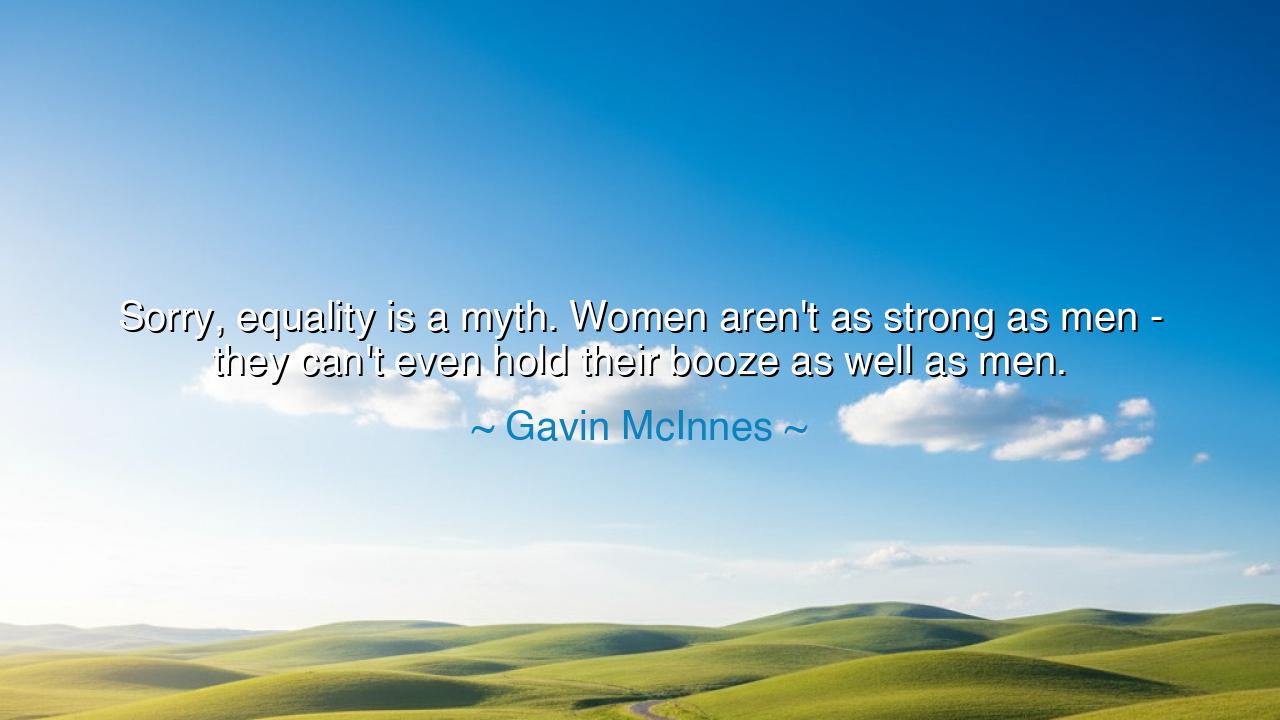
Sorry, equality is a myth. Women aren't as strong as men - they
Sorry, equality is a myth. Women aren't as strong as men - they can't even hold their booze as well as men.






"Sorry, equality is a myth. Women aren't as strong as men - they can't even hold their booze as well as men." These words, spoken by Gavin McInnes, are laced with an ignorance that seeks to diminish the inherent dignity and worth of half the human race. To say that equality is a myth is not only to deny the truth of human potential, but to perpetuate harmful stereotypes that limit the possibilities of both men and women. Such a statement, at its core, ignores the vast differences that define individuals, not by their gender, but by their character, their choices, and their strengths—qualities that cannot be measured by crude comparisons or shallow generalizations.
In the great struggles for justice and equality that have unfolded throughout history, men and women have both proven their worth in countless ways. Consider the legendary Joan of Arc, a young woman who, in an age where women were often denied the right to speak, let alone lead, rose to command an army and fight for the freedom of her people. Her strength was not physical alone, but mental and spiritual. She proved that strength does not reside in the muscles, but in the will, the heart, and the soul. To say that women are inherently weaker than men is to ignore the immense strength they have demonstrated in the face of adversity, both historically and in the present day.
Gavin McInnes's statement about booze is a particularly narrow and misguided view of human strength. It reduces people to simple categories, using the most superficial of metrics to determine their value. The ability to "hold your booze" is not a measure of strength—it is a trivial measure of one's tolerance for alcohol, and to suggest that it reflects any deeper qualities of character is to miss the very essence of what it means to be human. Strength, in its truest sense, is about resilience, about the ability to overcome hardship, to face fear, and to persevere in the pursuit of justice and goodness. These are qualities that are not limited by gender or any other surface trait.
In fact, the very notion of equality has been fought for by those who recognized that human worth is not defined by the body but by the mind and the spirit. The suffragists, such as Susan B. Anthony and Elizabeth Cady Stanton, faced ridicule and violence as they fought for women’s right to vote. They were not “weaker” than their male counterparts, nor did their ability to endure pain and hardship make them inferior. Rather, their strength lay in their courage to challenge the societal norms of their time, to speak truth to power, and to demand that women be recognized as equals in every sense of the word.
Consider also the tale of Sojourner Truth, an African American woman born into slavery, who defied the expectations of her time and became one of the most powerful voices in the abolitionist and women’s rights movements. Truth’s strength was not in physical might, but in her unyielding commitment to justice, her ability to confront the harshest of circumstances, and her bravery in speaking out for the voiceless. If equality were a myth, then Truth’s very life, her victories, and her resilience would stand as a testament to its profound and undeniable reality.
It is essential that we understand the meaning of equality not as a matter of physical comparison, but as a matter of human dignity and respect. To say that equality is a myth because one gender may possess different physical characteristics than another is to ignore the deeper, more meaningful ways in which equality is realized. It is the equality of opportunities, the equality of respect, and the equality of rights that form the true measure of a society’s commitment to justice. Gavin McInnes's claim fails to recognize that strength comes in many forms, and that both men and women possess unique gifts that should be celebrated, not diminished.
The lesson for future generations is clear: equality is not a myth—it is a truth rooted in the very essence of what it means to be human. We must not measure the worth of individuals by outdated standards or shallow comparisons, but by their character, their integrity, and their contributions to the world around them. Let us reject the false narratives that seek to divide us based on gender or any other superficial trait. Let us embrace a world where strength is measured by courage, by wisdom, and by the actions we take to uplift each other in the pursuit of justice.
So, future generations, remember that the true equality that we seek is not one that conforms to old ideas of strength and ability, but one that recognizes the infinite potential in all people. Let us prioritize respect, understanding, and compassion in our interactions, and celebrate the unique strengths that each individual, regardless of gender, brings to the world. Through this, we will move toward a future where the myth of inequality is left behind, and equality reigns, not just in words, but in the way we live our lives.






AAdministratorAdministrator
Welcome, honored guests. Please leave a comment, we will respond soon